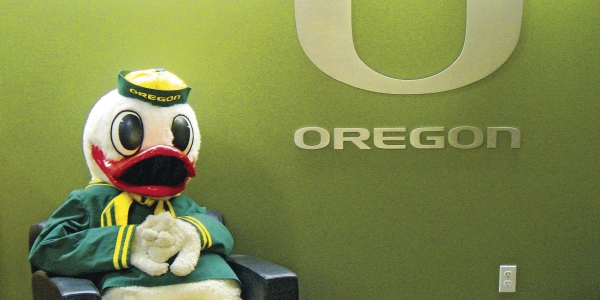5/1/2016: Text and video here: http://chronicle.com/article/Video-A-Call-to-Replace/236224. This is a brief follow up to Stripling’s “An Academic Reputation at Risk” report on UO, from September. That story is still gated if you are off campus, but here are some extracts below.
The re-interview touches on realignment and fundraising, and there’s a surprising amount on Schill’s decision to dump our 160over90 branders. Apparently UO’s academic side, and Schill, are still getting good publicity from our new “No branding crap” brand. Thank you Diane Dietz!
Which prompted me to look at UO’s home page for the first time in months. Some of the 160over90 damage has been reversed – I didn’t see any mention of What the If? or whatever it was – but it’s still hard to navigate. Which explains why the UO Matters “Crap-Free UO homepage” (TM) is still so popular.
9/14/2015: Chronicle’s Jack Stripling profiles UO and President Schill
Long article, well worth reading it all. Posted today, here: (Gated if you are off campus).
An Academic Reputation at Risk: The U. of Oregon’s big brand masks its fragile standing

The duck is always up in everybody’s face. He shoves. He body-slams. He demands to be noticed.
The University of Oregon’s mascot, a Donald Duck knockoff in yellow and green, is a pure distillation of the university’s iconic brand. This is a place, the duck assures us, of unapologetically splashy sports and irrepressible good times. The image sells remarkably well to undergraduates, whose numbers have increased by 25 percent in the past decade alone.
… On a recent summer afternoon here, an admissions official asked a group of prospective students and their parents what they had already heard about the university.
Toward the back row, a young man said, “Big football team.” “Nike,” another chimed in, citing the university’s longstanding affiliation with the company’s co-founder, Phil Knight. “Track,” another said.
That’s to be expected, given how we recruit these students – UO’s administrators use football bowl games as undergraduate admissions events, so they can get the university to pay for their own junkets, family included.
Of course, there are other ways to attract students. Here’s the report from UC-Boulder admissions, where they emphasized academic rigor, instead of big-time sports (they’re currently #78 in the football rankings). Seems to be working:
A total of 3,083 Colorado residents enrolled as new freshmen in the fall class, as well as 2,786 from out of state and a record 386 freshman international students, a 41 percent increase from last year. …
“Our efforts in recent years to improve the academic rigor at CU-Boulder are paying off with the most academically qualified class we’ve ever seen,” said CU-Boulder Chancellor Philip P. DiStefano. “Our Esteemed Scholar program, and our other scholarship and academic programs, continue to attract Colorado’s best and brightest to CU-Boulder, along with outstanding students from around the nation and the world.”
This year’s freshman class includes a total of 898 Colorado freshmen who were awarded Esteemed Scholarships, based on high school grades and SAT/ACT scores, up from 789 last year. For out-of-state students, 425 were awarded the Chancellor’s Achievement Scholarships, 77 more than in 2013, and 102 were awarded Presidential Scholarships, up 18 from last year.
Stripling’s story continues with some information on the tensions that UO’s emphasis on big-time athletics at the expense of academics have created between the faculty and the administration, and President Schill’s plans to deal with them.
In Mr. Schill’s view, the university needs to break down barriers between professors and administrators. On the symbolic front, he has invited faculty members into his home, and asked them to stock his office library with their books. He has portrayed himself as a faculty member first, insisting that the title of “professor” appear alongside “president” on his business cards.
More substantively, Mr. Schill has signed off on a new contract with the faculty union, and he has agreed to settle a contentious lawsuit with the Oregon student who accused three basketball players of raping her.
“We need to end the circular firing squad,” Mr. Schill says, “and I think we’ve started that.”
If Oregon can avoid turning on itself, Mr. Schill says, the university can reverse the trends that have held it back.
Every promise Mr. Schill has made hinges on the success of a $2-billion capital campaign. The money will be used in part to hire 80 to 100 new tenured or tenure-track professors over the next four to five years.
… “I don’t want to sound too egotistic or narcissistic, but what was missing here was leadership,” says Mr. Schill, who is 56. “The last piece of the puzzle wasn’t here yet, which was a president who was going to stay and build a great university. I’d like to think I’m the person. History will look back and say whether I was.”
10/15/2015: Jefferson Public Radio interviews Jack Stripling